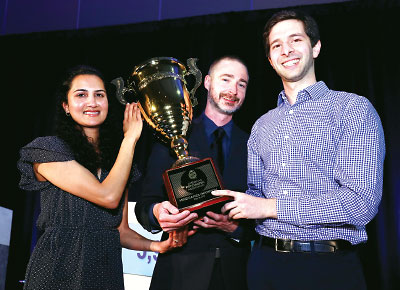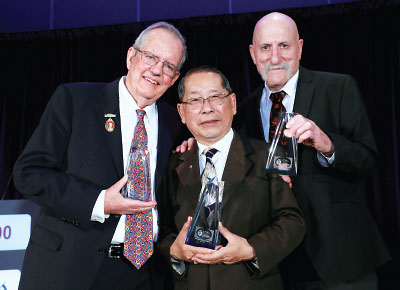MindGames Playoffs Offer Double Treat to Meeting Attendees
Abstract
The traditional residents’ competition was followed by a special version of MindGames as part of APA’s 175th anniversary celebration.
This physician is the first African American female psychiatrist to be elected to serve as president of the American Medical Association.
This French psychiatrist was the first to coin the term “hallucination.”
(Don’t know the questions? See the end of this article.)
MindGames, the “Jeopardy”-like quiz game, has become one of the Annual Meeting’s most popular attractions, and this year attendees had two versions—the traditional resident competition and a special history version in honor of APA’s 175th anniversary.

From left: Meenakshi Denduluri, M.D., Brandon Bentzley, M.D., and Robert Kleinman, M.D., of Stanford University pose with the 2019 MindGames trophy.
Residents from Stanford University won the 2019 resident competition, while a team named in honor of early mental health crusader Dorothea Dix won the history competition.
A packed hall and people hunched four and five deep outside the doors watched the competition. Residents demonstrated their knowledge on topics related to clinical care, psychiatry and the law, developmental theory, and other topics—but at the meeting where APA’s 175th Anniversary was being celebrated, history topics were prominent. (The first physician to identify lithium’s benefits in the treatment of bipolar disorder, this individual initially suggested that mania was caused by a lithium deficiency. Question: Who was John Cade, M.D.?)
Third-year Stanford psychiatry residents Meenakshi Denduluri, M.D., Brandon Bentzley, M.D., and Robert Kleinman, M.D., won the 15th edition of this contest. They beat residents from the University of Arizona and Drexel University College of Medicine.
Competing for Drexel University were Aditya Pawar, M.D., Aarya Rajalakshmi, M.D., and Prasad Joshi, M.D. Competing for the University of Arizona were Sneha Venkatraman, M.D., Michelle Singh, D.O., and Jonathan Lavi, M.D.

The winners of the APA 175th Anniversary MindGames competition were (from left) John McIntyre, M.D., Albert Gaw, M.D., and Jeffrey Geller, M.D.
Preceding the resident competition, nine APA luminaries grouped into three teams answered questions on a variety of history-themed topics, including visual categories that featured photos from APA’s Archives. Their performance was admirable, except for the category of psychiatry in the media (none of them knew that Norman Bates in “Psycho” would be diagnosed with dissociative identity disorder), which led MindGames judge Michelle Riba, M.D., to joke that psychiatrists may need to get out more.
In the end, the trio known as the Dorothea Dixiformidables—John McIntyre, M.D. (APA past president), Albert Gaw, M.D. (past APA Assembly speaker), and Jeffrey Geller, M.D. (incoming APA president-elect)—did indeed prove formidable and ran away with the title.
Art Walaszek, M.D., the residency training director in the Department of Psychiatry at the University of Wisconsin, hosted both the anniversary and the resident competitions. Joining Riba as judges for both competitions were Richard Summers, M.D., APA trustee-at-large and a senior residency advisor in the Department of Psychiatry at the University of Pennsylvania, and Marcy Verduin, M.D., assistant dean for students at the University of Central Florida College of Medicine. Riba is a clinical professor and associate director in the Department of Psychiatry at the University of Michigan and director of the PsychOncology Program at the University of Michigan Rogel Cancer Center. ■
Question for the final resident competition answer: Who is Patrice Harris, M.D.? Question for the final history competition answer: Who is Jean-Étienne Esquirol?



